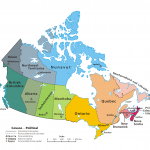 The Centre for Law and Democracy today released the results of a comparative study which highlights problems with Alberta’s access to information legislation. The study compared access to information legislation from Alberta, British Columbia, Ontario and Nova Scotia using the RTI-Rating Methodology, an analytical tool developed to assess the strength of access laws. Alberta’s Freedom of Information and Protection of Privacy Act (FIPPA) finished last in the group.
The Centre for Law and Democracy today released the results of a comparative study which highlights problems with Alberta’s access to information legislation. The study compared access to information legislation from Alberta, British Columbia, Ontario and Nova Scotia using the RTI-Rating Methodology, an analytical tool developed to assess the strength of access laws. Alberta’s Freedom of Information and Protection of Privacy Act (FIPPA) finished last in the group.
British Columbia topped the rankings, scoring 97 points out of a possible 150, while Ontario came second with 86 and Nova Scotia placed third with 82, just ahead of Alberta which scored 80.
Click here for our full Analysis for British Columbia
Click here for our full Analysis for Ontario
Click here for our full Analysis for Nova Scotia
Click here for our full Analysis for Alberta
“Alberta’s access to information law is weak,” said Toby Mendel, Executive Director of the Centre for Law and Democracy. “But all of the four provincial laws that we rated have problems, as does our federal law. Given the repeated political scandals involving a lack of accountability, we hope that the this study will raise awareness about the urgent need to improve Canada’s access to information laws across the board.”
Alberta’s poor score came mainly as a result of the narrow scope of the law and the overly broad regime of exceptions. These loopholes, which include blanket exclusions for the offices of MLAs and for information relating to government contracts, severely undermine the ability of the law to function properly as a tool for public accountability.
CLD plans to produce a comprehensive ranking of all 14 Canadian access to information laws. This work is part of CLD’s broader RTI-Rating Project, which includes a comparative assessment of 89 national right to information laws, released in September 2011. Canada came in 40th place worldwide with a score of 85. Alberta would have placed 51st on that survey, just behind Angola, Colombia and Niger.



